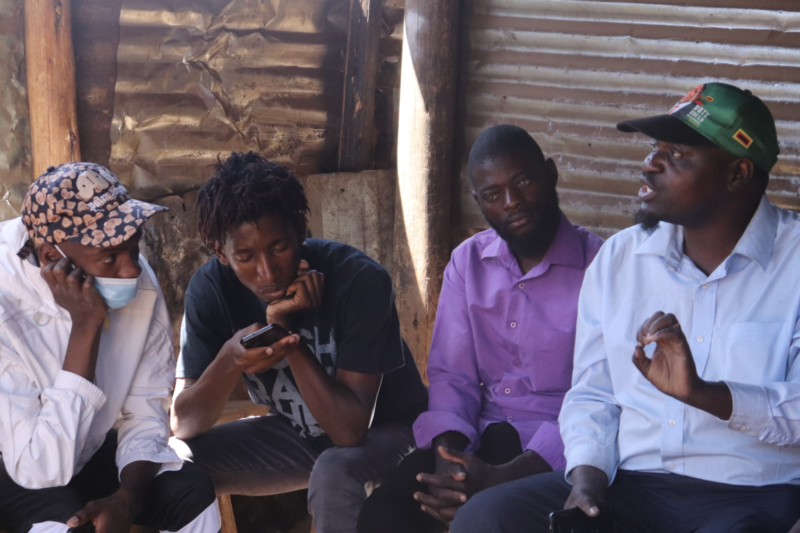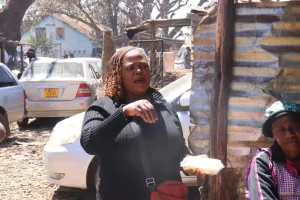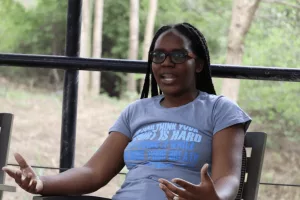NEWS

IN BRIEF
By Nosikelelo Ndlovu Accountability Lab Zimbabwe powered through a complex […]
SHARE
By Nosikelelo Ndlovu
Accountability Lab Zimbabwe powered through a complex programming year in 2022 with the government proposing the Private Voluntary Organizations (PVO) Bill, described by experts as a threat to civil society operations. The country is also actively gearing up for elections scheduled for early 2023. However, the year also presented opportunities for us to improve our work, particularly with increased responsiveness and willingness to engage with communities by political leaders seeking re-election. In true Lab style, AL Zimbabwe conducted regular reflection sessions to continuously learn from monitoring data and critical insights in ways that allowed us to adapt our interventions to context.
Accountability Lab’s work in Zimbabwe seeks to address entrenched political, social, and economic dynamics around accountability by incentivizing communities to try new, innovative approaches to change governance outcomes from the bottom up. This aim is not easy to achieve in a country as polarized as Zimbabwe, where NGO orthodoxy prevails but often with limited results. AL Zimbabwe’s work involves young people who are not easy to keep engaged and interested in accountability and governance issues using conventional methods. A consistent need is innovating and creatively fashioning interventions to retain young people’s interest and engagement. This requires us to connect with the youth in creative ways and languages that they understand.
 In 2022 AL Zimbabwe leveraged its visual and audio storytelling programs, which target young people through music and film. This was effective in spotlighting the accountability issues emerging from community-facing interventions via our CivActs campaign. Three of the Voice2Rep alums, Voice2Rep 2022 Winner Ndonzi Beatx, alumni Wyan and Rudo Amor, collaborated with CivActs partners to use music as a channel for important messages in Mbare. They produced a 3 track album called the Block 10 EP. This dynamic cross-project collaboration between Voice2Rep and CivActs appealed to the youth and duty bearers, and provided further impetus to work together to address glaring service delivery challenges.
In 2022 AL Zimbabwe leveraged its visual and audio storytelling programs, which target young people through music and film. This was effective in spotlighting the accountability issues emerging from community-facing interventions via our CivActs campaign. Three of the Voice2Rep alums, Voice2Rep 2022 Winner Ndonzi Beatx, alumni Wyan and Rudo Amor, collaborated with CivActs partners to use music as a channel for important messages in Mbare. They produced a 3 track album called the Block 10 EP. This dynamic cross-project collaboration between Voice2Rep and CivActs appealed to the youth and duty bearers, and provided further impetus to work together to address glaring service delivery challenges.
In many ways, AL’s insights around building unlikely networks and moving away from the “usual suspects” informed this collaboration. With it, through the described alchemy of actors (young people, artists, CBOs, and ordinary community members), AL Zimbabwe demonstrated how anti-corruption work and building integrity is not just the purview of NGOs and governance experts, but rather, everyone’s business. The Block 10 Ep is a departure from the myopic approach to coalition building which is usually centered on just civil society organizations. In 2023, AL Zimbabwe will explore how to broaden the coalition of anti-corruption champions as well as accountability and integrity advocates through building greater unlikely networks’ among civil society, government officials, musicians, creatives, technologists, filmmakers, the private sector, faith-based organizations, community groups, and movements. We have already seen how the Block 10 initiative has opened up accountability work and generated much stronger engagement around core accountability issues. We will use these lessons to scale up our partnerships across society.
A similar collaboration involved the production of mini-documentaries about community accountability issues that we completed. Film Fellowship alumni, Mary Mundeya, Jacqueline Arifandika, and Lance Chigodo worked with Accountability Incubator graduate. Lemuel Chekai. Jacqueline’s film, Drug War, is set in Ntabazinduna, a township 38km out of Bulawayo, and focuses on the prevalence of drug use in Matabeleland North Province. The film is informed by CivActs findings in Chitungwiza, where CivActs partner, the National Association for Youth Organisations (NAYO), operates. The film by Mary Mundeya spotlights the disproportionate impact of poor service delivery on women in Glenview and Mbare, inspired by Amandla Network’s CivActs work. Lemuel Chekai zeroes in on gender-based violence at water points in Chitungwiza, while Formalizing the Informal Sector by Lance Chigodo takes a deep dive into the life of informal traders in Bulawayo post-COVID-19 lockdowns. The Vendors Initiative for Social and Economic Transformation (VISET) works in Bulawayo as part of the CivActs project. These documentaries show how local problems can be equally relevant nationally.
The productions allowed us to demonstrate Accountability Lab’s commitment to partnerships and crowding others in to intervene. We used the documentaries to link our local efforts to those working at different points in accountability systems to amplify change at a national level.
Facilitating space for initiatives to grow beyond project support
Our alums continued to take ownership of the products and initiatives they developed during their Fellowships and training with AL Zimbabwe. This allowed them to improve the initiatives and reach beyond project support. For example, Ska Sebata successfully submitted the film she produced during her Fellowship to several local and International Festivals. This allowed the film to generate conversations on gender accountability at a global level. Her short film, Her: A Disintegrated Notion, has been featured at the African Film Festival in New Zealand, Zimbabwe International Film and Festival Trust, and the Sotambe International Film Festival in Zambia. Courtney Mukoyi also continued to develop and expand the reach of the mobile application Astrea Justice, developed during his time as an Accountapreneur. His application ended the year as the winner of the Democracy Innovation Award from the World Forum for Democracy, with the possibility of innovators from other countries picking up the initiative for localization in their contexts.
 One of the insights we have gained is the need to implement a more robust framework to support alumni beyond their fellowships and participation. Last year showed us that despite our best intentions, where insufficient support is offered for mobility, product enhancement, marketing or support for follow-up actions, some brilliant initiatives might fail to reach their full potential. AL Zimbabwe is currently devising a plan to provide sustainable support beyond participation, especially in light of finite resources. In 2023, we will experiment with an Alumni Support Framework based on enhancing spaces for shared learning and collaborations and a small mobility and acceleration fund.
One of the insights we have gained is the need to implement a more robust framework to support alumni beyond their fellowships and participation. Last year showed us that despite our best intentions, where insufficient support is offered for mobility, product enhancement, marketing or support for follow-up actions, some brilliant initiatives might fail to reach their full potential. AL Zimbabwe is currently devising a plan to provide sustainable support beyond participation, especially in light of finite resources. In 2023, we will experiment with an Alumni Support Framework based on enhancing spaces for shared learning and collaborations and a small mobility and acceleration fund.
Active Alumni Networks make for easier impact tracing
The impact of our work takes time to manifest, most often after the participants have completed their program. Accountability Lab challenges development orthodoxy by focusing on the longer-term impact, such as shifting norms, values, or policies, rather than short-term fixes.
With an effective learning system, tracking alumni work after direct participation can be more manageable. In response to the emerging need for continued engagement with participants and to consolidate a strong group of change-makers who share common values, AL Zimbabwe is exploring ways to maintain an active alumni network. So far, we have established an annual “Big Meet’’ as well as a town-hall session under the theme of ‘A founder’s journey’. Maintaining an active alumni network will allow us to keep track of our impact and consolidate our growing network. We are excited to explore ways to keep our graduates engaged in 2023.
As a learning organization, constantly pausing to reflect on our work, adapting, and innovating will be critical to ensure our growth and success. We hope to continue to learn from our experiences and expand our networks in the year ahead.
*Nosikelelo is the Monitoring Evaluation and Learning Officer for Accountability Lab Zimbabwe.
